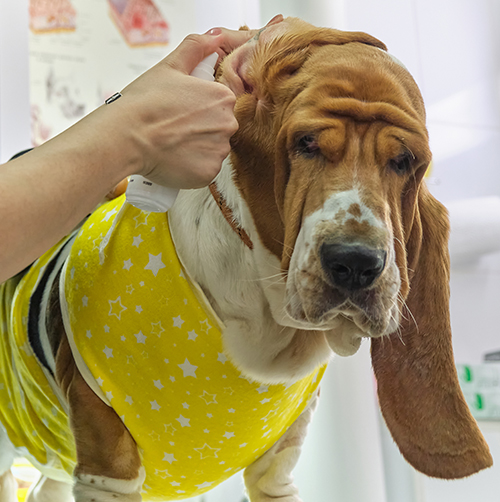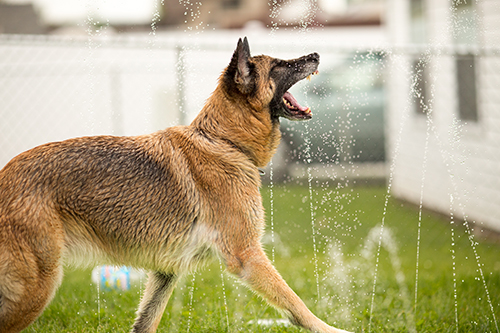 Most pet owners show their furry friends love by purchasing plenty of toys, nutritious food, treats, a warm bed and much more. Another way to show your pet just how much you love them is to vaccinate and immunize on a scheduled basis for optimal health. The proper vaccinations will keep them safe from infectious diseases that have the potential to be deadly. Charles D. Whitworth, DVM and his team will consult with you to select vaccines based on your pet’s lifestyle. Going forward, his staff will keep you informed of your pet’s specific needs for booster vaccinations as they age.
Most pet owners show their furry friends love by purchasing plenty of toys, nutritious food, treats, a warm bed and much more. Another way to show your pet just how much you love them is to vaccinate and immunize on a scheduled basis for optimal health. The proper vaccinations will keep them safe from infectious diseases that have the potential to be deadly. Charles D. Whitworth, DVM and his team will consult with you to select vaccines based on your pet’s lifestyle. Going forward, his staff will keep you informed of your pet’s specific needs for booster vaccinations as they age.
Why are Vaccinations Necessary?
Vaccines prepare the body’s defense system to fight invasion by disease-causing organisms by helping the body to recognize foreign invaders. Vaccines contain antigens, which are weakened or dead virus cells that do not produce symptoms of the disease or infection. When introduced into your pet’s system, these antigens mildly stimulate the immune system, causing the body to produce antibodies and memory cells of the disease in response. Now your pet’s immune system can recognize and fight off infection should they be exposed to the real disease in the future.
Types of Vaccinations
There are two main categories of vaccinations that your pets can receive – core vaccines and non-core vaccines.
- Core: Core vaccines are considered vital to all pets based on “risk of exposure, severity of disease or transmissibility to humans.” This set of vaccines include protection against diseases such as distemper, rabies, canine parvovirus and canine hepatitis in dogs and distemper, feline calicivirus, rabies and feline herpes in cats.
- Non-Core: Non-core vaccines may be recommended based on your pet’s lifestyle, age, medical history, and travel habits (indoor, outdoor, boarded, etc.) Non-core vaccines can include protection against diseases such as influenza and Lyme disease in dogs and feline leukemia and other respiratory illnesses for cats.
When to Start Vaccinating
It is imperative to your pet’s protection that vaccines be given at the correct time interval and the correct age. It is especially important for young animals with weaker immune systems to be properly vaccinated between the ages of 6 and 8 weeks and be completed near 16 weeks.
Similar to infant humans, puppies and kittens should receive doses of particular core infectious vaccines to help prime, immunize and boost their immune system response at an early age. It is recommended that puppies and kittens begin their vaccination routines between 8 to 16 weeks of age every 3 to 4 weeks, with the final dose being administered at 16 weeks of age. It is also worth noting that every dog and cat is different – so it is best to work with your veterinarian to determine a tailored vaccination plan that is right for your fur baby.
Your pets will also need regular booster shots as they mature to ensure their vaccinations are up-to-date and still protecting their health. But it’s likely that your pet may no longer need annual booster updates as was previously best practice. According to the AAHA guidelines, if your puppy or kitten received their initial series of core vaccinations within the proper timeframe, your pet may only need booster vaccine shots every three years due to increased effectiveness and safety of routine vaccinations.
Are Adverse Reactions Possible?
Most pets experience no ill effect from the vaccination process; however, there is always the possibility that your pet may have an adverse reaction to the injection. It’s important to monitor your pet’s behavior within the first few hours following a vaccine injection for any adverse reactions including:
- Discomfort and local swelling at the vaccination site
- Mild fever
- Decreased appetite and activity
- Sneezing, mild coughing, “snotty nose” or other respiratory signs may occur 2-5 days after your pet receives an intranasal vaccine
More serious reactions may include:
- Persistent vomiting or diarrhea
- Itchy skin that may seem bumpy (“hives”)
- Swelling of the muzzle and around the face, neck, or eyes
- Severe coughing or difficulty breathing
- Collapse
Please call Whitworth Animal Clinic at 256-830-1503 for an appointment or with any questions regarding pet vaccinations. We also provide care for geriatric pets, eye problems, parasite infestations and so much more. We have a top-notch boarding facility and a super-star groomer. Let us be your veterinary practice of choice. We will not let you down.







Leave A Comment